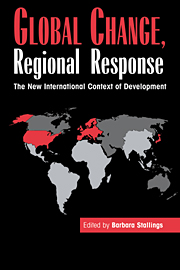Book contents
- Frontmatter
- Contents
- List of tables and figures
- List of contributors
- Acknowledgments
- Abbreviations
- 1 Introduction: global change, regional response
- Part I Global changes
- 2 The third world and the end of the cold war
- 3 Capitalisms in conflict? The United States, Europe, and Japan in the post–cold war world
- 4 Global production systems and third world development
- 5 New global financial trends: implications for development
- 6 The “triumph” of liberal economic ideas in the developing world
- Part II Regional responses
- Part III Conclusions
- Index
6 - The “triumph” of liberal economic ideas in the developing world
Published online by Cambridge University Press: 05 June 2012
- Frontmatter
- Contents
- List of tables and figures
- List of contributors
- Acknowledgments
- Abbreviations
- 1 Introduction: global change, regional response
- Part I Global changes
- 2 The third world and the end of the cold war
- 3 Capitalisms in conflict? The United States, Europe, and Japan in the post–cold war world
- 4 Global production systems and third world development
- 5 New global financial trends: implications for development
- 6 The “triumph” of liberal economic ideas in the developing world
- Part II Regional responses
- Part III Conclusions
- Index
Summary
Since the beginning of the 1980s most of the developing world has moved unevenly but undeniably toward liberal, market-oriented economic reforms. The 1960s and 1970s were decades of unprecedented economic nationalism, a growing role for state intervention in the economy, and experimentation with variants of socialism and self-reliance. Comprehensive development planning was widespread, and the prevailing model of development throughout much of Latin America, Asia, and Africa was a variant of a statist, largely inward-oriented import-substitution industrialization. It was also socially redistributive, at least in rhetoric. The 1980s and 1990s, by contrast, have provided a nearly complete reversal in economic policy. Virtually everywhere, developing countries have begun restructuring the nature of their intervention in the domestic economy, liberalizing their domestic trade and investment regimes, privatizing state-owned enterprises, and pursuing a variety of economic reforms.
Behind these policy changes was a new set of ideas. According to some observers, the striking convergence in the pattern of economic (and political) reform efforts reflects a “triumph” of liberalism on a global scale. It is the “end of history,” ushering in a new period of liberal ascendance. This theme has been popularly restated by the U.S. media during the past several years. The extent to which this vision of the new world order is globally shared is subject to serious debate and will be considered in further detail later in this chapter. Nevertheless, there is little doubt that there has been a major change in the language used, the distinctions promulgated, and issues considered important during the past fifteen years.
- Type
- Chapter
- Information
- Global Change, Regional ResponseThe New International Context of Development, pp. 174 - 196Publisher: Cambridge University PressPrint publication year: 1995
- 35
- Cited by



